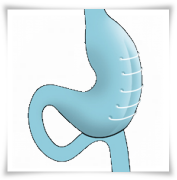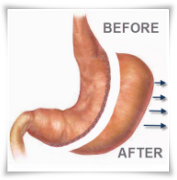Eating After Gastric Sleeve
Eating after gastric sleeve surgery is one of the most important factors that will ensure a successful weight loss treatment. The gastric sleeve is an irreversible surgical technique used to help morbidly obese people that have a BMI of 50 or more lose weight, and eating after gastric sleeve surgery is just as important as the surgery itself.
Click here to read more about what to expect After Gastric Sleeve Surgery
The gastric sleeve procedure will remove approximately 60% to 85% of the patient’s stomach so you must pay attention to eating after gastric sleeve surgery. The remaining stomach will then be formed like a tube and sealed up. Gastric sleeve surgery can be performed as open surgery, or laproscopically, through tiny incisions and can be a stand-alone treatment, or it can be an initial stage of a two-stage treatment, with a gastric bypass as the second stage. The initial recovery period will be 48 hours, usually in a hospital or a facility where the patient can be monitored.
As you’ve read elsewhere on this website, gastric sleeve is a restrictive method of bariatric surgery. Your stomach is reduced in size, and the quantity of food you will be eating after gastric sleeve surgery will also be reduced. Therefore, healthy eating after gastric sleeve surgery is critical…the foods that you put in your mouth must provide your body with sufficient nutrients and calories. You must also pay attention to the amount of food you are eating after gastric sleeve surgery, ensuring that you do not overeat.
During the surgery, the part of your stomach that produces Ghrelin is removed. Ghrelin is responsible for encouraging hunger, but since there is no Ghrelin produces, you will not feel hungry. The mental aspect however, is a different story. You are accustomed to eating a certain amount of food, and you will dish out the food accordingly, but the amount of food you will be eating after gastric sleeve surgery will be considerably less, so you must learn to take smaller servings. This is where behavior modification will play a role, it will help you learn to eat less without thinking about it…proper eating after gastric sleeve surgery is learned behavior.
If you are not following your diet, and eating after gastric sleeve surgery is not changed, you will run into many complications. Issues like stomach stretching will make the surgery a waste of time since the entire point of the procedure is to limit the amount of food. If your stomach stretches then you will eat more food, and that will lead to a very slow weight loss, if any weight loss at all. Actually, stomach stretching may lead to gaining the weight back over time, so eating after gastric sleeve surgery is critical to your success.
A General Guide to Eating After Gastric Sleeve Surgery
 Step 1 – Liquids and Full Liquids
Step 1 – Liquids and Full Liquids
In the first 2 weeks, eating after gastric sleeve surgery will be strictly limited to liquid nutrition only. Clear liquids like water, diluted juice without sugar, flat or non-carbonated sugar-free soda, tea with no sugar, and some Jell-O will be permitted for the 1st week, depending on the advice of your bariatric surgeon. Full liquids like milk, soups, thinned cream of wheat, puddings, protein shakes, or rice can be eaten over the next 2 weeks. Protein shakes will help to maintain an adequate amount nutrition in the body, and should be the first thing you start eating after gastric sleeve surgery.
Step 2 – Soft Foods
In the next step you will advance to the soft foods. Things like mashed potatoes, pureed vegetables, pureed meat, soups, eggs, or fruits may be eaten over the next few weeks. Make sure you drink your liquids in between meals instead of with your meals.
Step 3 – Solid Foods
Here you may begin eating solid foods, which is typically 4 to 8 weeks following surgery, and depending on your surgeon’s recommendations, people will usually move on to eating solid foods. Limit the number of daily calories to a range of 600 – 800 calories per day. The smaller size of the stomach will reduce physical hunger, but it will not reduce emotional eating or cravings.
Step 4 – Continue Behavior Modification
Eat slowly, make sure to chew thoroughly and definitely stop eating as soon as you feel full. Developing a normal eating pattern and adjusting your eating behavior will help you lose 50% – 80% of the extra weight within the first 6 to 12 months. Behavior-modification techniques can help you adopt much healthier eating habits, and proper eating after gastric sleeve surgery can also help you keep the weight off in the long run.
Step 5 – Increasing Your Calorie Intake
When you have reached your ideal weight, you may increase your calorie intake up to 1,000 – 1,200 calories per day in order to maintain your new weight.
Please note that this is a general outline to eating after gastric sleeve surgery. Consult your bariatric surgeon, doctor, or nutritionist to get the facts on eating after gastric sleeve surgery.
Eating After Gastric Sleeve – Tips and Warnings
Eating after gastric sleeve surgery can be a bit tricky at first, but the change is essential to your success. By following these tips and heeding the warnings below, eating after gastric sleeve surgery, sticking to your diet, and eating the right portions will not be a problem.
Tip: Chew Your Food Thoroughly
One very important thing you should remember when you begin eating after gastric sleeve surgery is to thoroughly CHEW YOUR FOOD. Your stomach is still healing, so you must avoid putting any unnecessary stress on your tummy. If you do not chew your food properly, your stomach will have a hard time digesting it, and it can also lead to some complications such as leakage.
Tip: Use Smaller Cutlery
One good tip is to use a smaller spoon or fork than you’re used to, which helps to control your portion sizes. Eating after gastric sleeve surgery can be controlled by manipulating how the food looks.
Tip: Use Smaller Plates
Similar to smaller cutlery, you should also use smaller plates or bowls. This will give the illusion that you are eating more food, but it just looks like more food because the plate is smaller.
Tip: Pay Attention To Your Food
Another tip is do not watch TV or read while you are eating after gastric sleeve surgery, because it is easier to consume many more calories than you need when you’re not paying attention to the food, so don’t get distracted.
Warning: Don’t Overeat
Another important thing you must keep in mind about eating after gastric sleeve surger is NEVER OVEREAT. Over eating after gastric sleeve surgery can cause your stomach to stretch. Be mindful of the amount of food you eat, so you should restrict food portions and calories in order to avoid regaining the weight you’ve lost.
Warning: Avoid Coffee
Coffee contains acids that will irritate your stomach, so definitely avoid coffee during the first couple weeks following surgery.
Your surgeon will recommend you meet with a dietician to help you lose weight. To get on your your way to healthier and happier you, make sure you heed the advice of your bariatric surgeon, and your nutritionist about eating after gastric sleeve.

